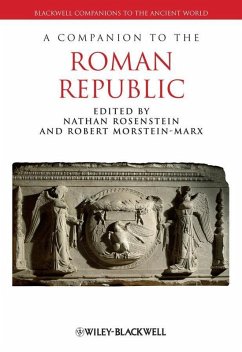This Companion provides an authoritative and up-to-date overview of Roman Republican history as it is currently practiced. * Highlights recent developments, including archaeological discoveries, fresh approaches to textual sources, and the opening up of new areas of historical study * Retains the drama of the Republic's rise and fall * Emphasizes not just the evidence of texts and physical remains, but also the models and assumptions that scholars bring to these artefacts * Looks at the role played by the physical geography and environment of Italy * Offers a compact but detailed narrative of military and political developments from the birth of the Roman Republic through to the death of Julius Caesar * Discusses current controversies in the field
Dieser Download kann aus rechtlichen Gründen nur mit Rechnungsadresse in A, B, BG, CY, CZ, D, DK, EW, E, FIN, F, GR, HR, H, IRL, I, LT, L, LR, M, NL, PL, P, R, S, SLO, SK ausgeliefert werden.
"This book, which will be many things to many readers, will bevaluable as a modern source and as a reference work vital in whatis the ever increasing complex world of ancient historicalresearch." (Scholia Reviews, 2009)
"Students cannot fail to benefit from the eminent collaborators[in this Companion].... Individual contributions have much foranyone keen to catch up." (Greece & Rome, 2008)
"It does provide readable, expert surveys of the rise of Romanpower in the Mediterranean in the formative imperial era. Inaddition to chapters on political and social topics, thisCompanion offers fine surveys of topography, literature andliterary sources, law, art and architecture, and Roman 'culturalidentity.'...Highly recommended." ( Choice)
"[Authors] do an excellent job of re-packaging RomanRepublican history ... and I applaud their efforts to provide... interesting debates within recent scholarship." (New England Classical Journal)"A Companion to the Roman Republic is a really exciting newresource. The contributors are individually heavy-hitters andcollectively form a first-rate international team. The work coversnot just the topics one would have counted on but other new onesthat deserve to become canonical. I'm happy that this work isnow available both for myself and for my students."
-Andrew M. Riggsby, University of Texas, Austin
"A comprehensive work ... It far outstrips any competitor inthis subject ... I only wish it had been available when I wasteaching the Late Republic."
-John Murrell, Journal of Classics Teaching
"A kaleidoscopic variety of points of views and insightfulcommentaries that finally does justice to the complexity of thesubject and of its possible interpretations, while always remainingreadable and clear."
-Nicola Terrenato, University of North Carolina at ChapelHill
"Students cannot fail to benefit from the eminent collaborators[in this Companion].... Individual contributions have much foranyone keen to catch up." (Greece & Rome, 2008)
"It does provide readable, expert surveys of the rise of Romanpower in the Mediterranean in the formative imperial era. Inaddition to chapters on political and social topics, thisCompanion offers fine surveys of topography, literature andliterary sources, law, art and architecture, and Roman 'culturalidentity.'...Highly recommended." ( Choice)
"[Authors] do an excellent job of re-packaging RomanRepublican history ... and I applaud their efforts to provide... interesting debates within recent scholarship." (New England Classical Journal)"A Companion to the Roman Republic is a really exciting newresource. The contributors are individually heavy-hitters andcollectively form a first-rate international team. The work coversnot just the topics one would have counted on but other new onesthat deserve to become canonical. I'm happy that this work isnow available both for myself and for my students."
-Andrew M. Riggsby, University of Texas, Austin
"A comprehensive work ... It far outstrips any competitor inthis subject ... I only wish it had been available when I wasteaching the Late Republic."
-John Murrell, Journal of Classics Teaching
"A kaleidoscopic variety of points of views and insightfulcommentaries that finally does justice to the complexity of thesubject and of its possible interpretations, while always remainingreadable and clear."
-Nicola Terrenato, University of North Carolina at ChapelHill

